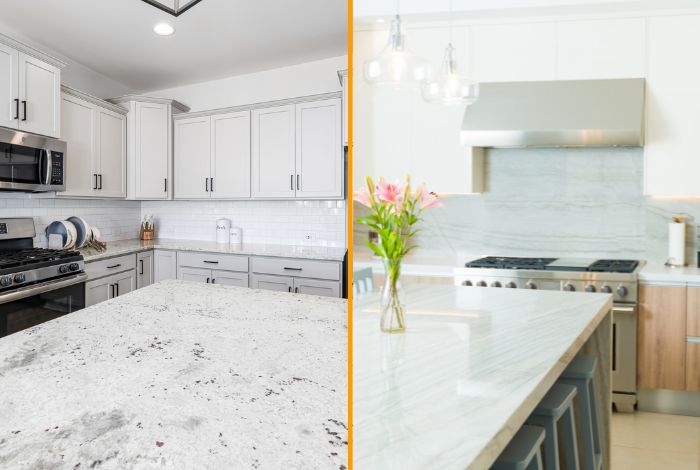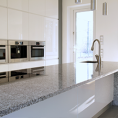The Pros and Cons of Marble vs. Granite Countertops

Choosing the right countertop material for your kitchen or bathroom is a crucial decision that affects both the aesthetic and functionality of your space. Marble and granite are two of the most popular natural stone options, each with its unique benefits and drawbacks. In this article, we will explore the pros and cons of marble and granite countertops to help you make an informed decision for your home.
Marble Countertops

Marble provides a timeless, elegant look that is unmatched in luxury, while granite offers exceptional durability and a wide range of design options.
Pros of Marble Countertops
- Elegant Appearance: Marble is renowned for its timeless beauty and luxurious appeal. The natural veining and wide range of colors make each slab unique, adding a touch of elegance to any space.
- Heat Resistance: Marble is naturally heat resistant, making it a suitable choice for kitchen countertops where hot pots and pans are common.
- Cool Surface: Marble remains cool to the touch, which is ideal for baking and pastry preparation as it helps to keep doughs and other ingredients at the perfect temperature.
Cons of Marble Countertops
- Porosity: Marble is a porous stone, making it susceptible to staining from spills like wine, coffee, and oil. Regular sealing is required to protect the surface.
- Scratching and Etching: Marble is softer than granite, which means it can be scratched or etched by acidic substances such as lemon juice or vinegar. Careful maintenance and use of cutting boards are essential.
- Maintenance: Marble countertops require more maintenance compared to granite. Frequent sealing and careful cleaning with pH-neutral cleaners are necessary to preserve their appearance.
Granite Countertops

Choosing the right countertop material for your kitchen or bathroom is a crucial decision that affects both the aesthetic and functionality of your space.
Pros of Granite Countertops
- Durability: Granite is one of the hardest natural stones, making it highly resistant to scratches, chips, and cracks. This durability makes it ideal for high-traffic areas like kitchens.
- Heat Resistance: Granite can withstand high temperatures, allowing you to place hot cookware directly on the surface without causing damage.
- Variety of Colors and Patterns: Granite is available in a wide range of colors and patterns, from subtle earth tones to vibrant hues, ensuring a perfect match for any design style.
Cons of Granite Countertops
- Porosity: While granite is less porous than marble, it can still absorb liquids if not properly sealed. Regular sealing is necessary to prevent staining.
- Cost: High-quality granite can be expensive, especially for larger installations or unique color patterns. However, the investment often pays off in terms of durability and aesthetics.
- Seams: In larger installations, seams may be visible where two pieces of granite meet. Professional installation can minimize the appearance of seams, but they may still be noticeable.
Comparing Marble and Granite
Aesthetic Appeal
- Marble: Offers a classic, timeless look with distinctive veining and a smooth, polished finish. Ideal for elegant and luxurious spaces.
- Granite: Provides a more varied appearance with a wide range of colors and patterns. Its natural beauty can enhance both traditional and contemporary designs.
Durability and Maintenance
- Marble: Softer and more prone to scratches and stains. Requires regular sealing and careful maintenance.
- Granite: Harder and more resistant to damage. Easier to maintain with periodic sealing.
Cost
- Marble: Generally more expensive due to its luxurious appeal and higher maintenance requirements.
- Granite: Can be more affordable, with prices varying based on color, pattern, and quality.
Use Cases
- Marble: Best suited for bathrooms, low-traffic areas, or as a decorative feature in kitchens where its beauty can be showcased without heavy use.
- Granite: Ideal for kitchen countertops, islands, and high-traffic areas due to its durability and resistance to damage.
Both marble and granite countertops offer unique advantages that can enhance the beauty and functionality of your home. Marble provides a timeless, elegant look that is unmatched in luxury, while granite offers exceptional durability and a wide range of design options. By considering the pros and cons of each material, you can choose the countertop that best suits your lifestyle, design preferences, and maintenance capabilities.






